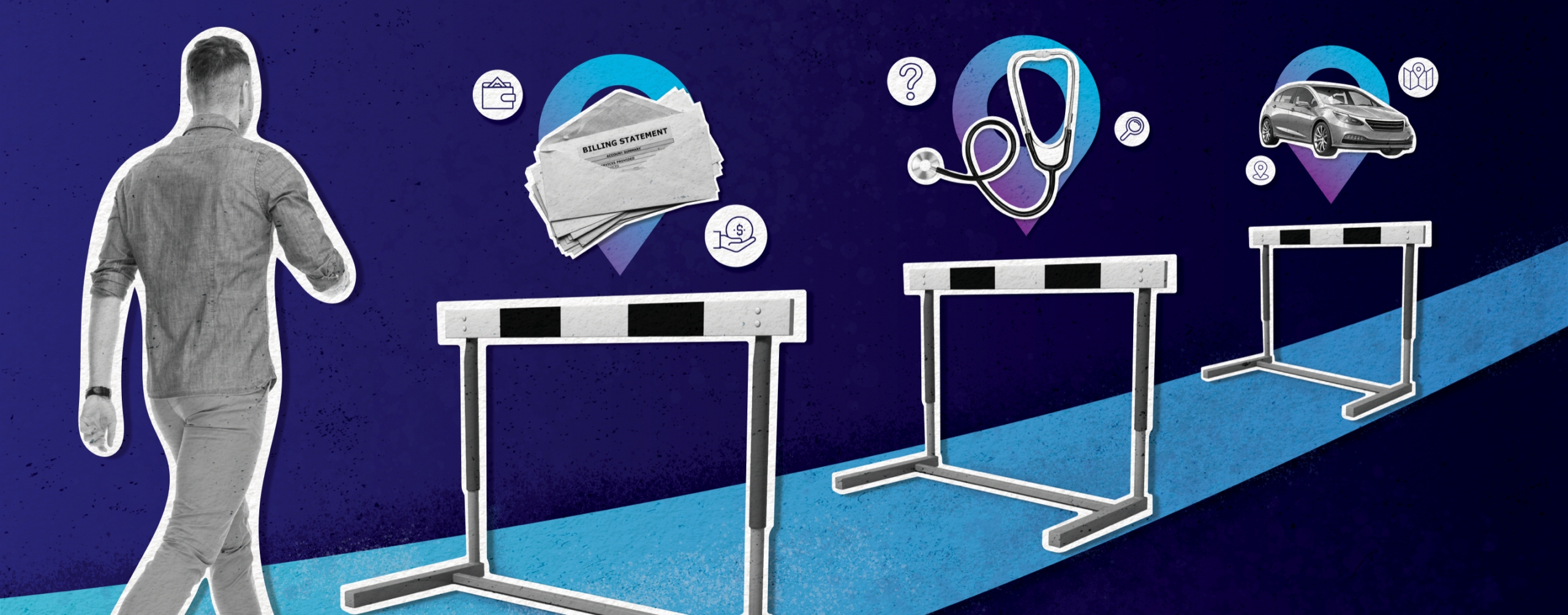Some people choose to relocate, in part to be closer to the medical care they need. Of course, traveling or relocating may be the exception rather than the rule, and this distance-related access barrier can compound both the physical and emotional impact of living with a chronic condition.
Certain specialties have a shortage of providers and therefore, HCP availability can pose another specialist access barrier or, in some cases, the perception of an access barrier. If patients need to wait a significant amount of time before they can see a specialist, it might dissuade them from bothering in the future to seek a specialist or lead them to solely rely on PCPs less trained in their condition. For example, Migraine In America 2020 survey findings reveal 43% of respondents who currently see a headache specialist and 39% who currently see a neurologist need to wait at least two months for appointments with those respective HCPs. And 13% of Atopic Dermatitis In America 2020 respondents who currently see a dermatologist avoid making appointments due to having to wait a long time for appointments.
Scheduling concerns can impact a patient at various points in their journey, including pre-diagnosis, during a flare-up and when they have relocated and are searching for a new specialist. One AnkylosingSpondylitis.net contributor recounts that, right after her husband was diagnosed, “our family doctor referred him to a local rheumatologist. When I called, they said it’d take 3-4 months to get in to see the doctor.”
Insurance, Cost Concerns
It has been well documented that paying for care, whether through insurance or out-of-pocket, is a significant barrier to specialist care.
For one AnkylosingSpondylitis.net patient opinion leader, “My healthcare was always money based: I went to doctors as I could afford them.” One IrritableBowelSyndrome.net patient leader, who said he “can’t afford good health insurance,” explained that he “also can’t afford to see a doctor as often as I would like or need to because of the copays and expensive costs of certain procedures.” Additionally, a Psoriatic-Arthritis.com patient leader discussed being “put on a payment plan with my doctor because I can’t afford the visits.”
For some, the challenge is that their insurance plan won’t cover certain specialist types or a specific specialist is out-of-network. Others simply can’t access affordable health insurance. Some might have coverage but are still burdened by out-of-pocket costs. Regardless of the situation, health insurance and cost issues can negatively impact specialist access across various conditions. For example:
- One-fifth of COPD In America 2020 respondents said they avoid seeing an HCP, unless they absolutely need to do so, due to cost concerns; a nearly equal amount said healthcare costs have prevented them from receiving needed care.
- Nearly a third of Migraine In America 2020 respondents who currently see either a headache specialist or a neurologist pay at least $50 per visit.
Poor Awareness of Specialist Care
While many people can’t access HCPs for a number of reasons, some might not realize a specific specialist would positively impact their care.
One AtopicDermatitis.net patient patient leader admits that, despite knowing she had to manage her eczema, she “somehow never really considered it a serious medical condition” and would end up sticking with “the same routine I always had.” Being able to eventually communicate the severity of her symptoms led to her connecting with a specialized dermatologist.
Not being able to communicate one’s condition severity might reduce the likelihood of pursuing or being referred to specialist care. To this point, Hidradenitis Suppurativa In America 2020 respondents who currently see a dermatologist were more likely than those who don’t to be diagnosed with a severe form of the condition; at the same time, respondents who don’t see a dermatologist were more likely to not know their current stage of diagnosis.
In some cases, like for those experiencing less severe symptoms, they might feel they are already receiving the care they need from their PCP. More than a quarter of Asthma In America 2020 respondents who do not currently see a pulmonologist said they have a great relationship with their PCP but might see a specialist periodically, if needed.
Can healthcare companies play a role in mitigating access concerns?
For healthcare companies, understanding the barriers to accessing specialists, and how that impacts people in condition communities, is the first step in developing solutions that address access gaps.
Fortunately, the evolution of technology serves as a potential opportunity for healthcare companies as they look to support patients on their health journeys. Specifically, the COVID-driven growth of virtual care approaches and telehealth has proven to be one way to mitigate some specialist access problems.
For example, nearly three-fourths of respondents – all living with chronic conditions – reported in late 2020 having at least one telehealth appointment during the COVID pandemic. Importantly, 44% of respondents said they were “extremely likely” to consider using telehealth moving forward. Additionally, more than six in 10 survey respondents who had used telehealth rated convenience as at least somewhat better than in-person office visits.Thus, telemedicine has a potential for mitigating some of the concerns people with chronic health conditions often experience around distance, scheduling and health insurance.
Engagement with Health Union Insights and Health Union’s growing portfolio of online health communities to perform Patient Journey research can offer unique insight and understanding into nuances of the journey. Learn more about Health Union’s custom media, marketing research and clinical services that can help you create smarter, more effective solutions for patients and caregivers.




